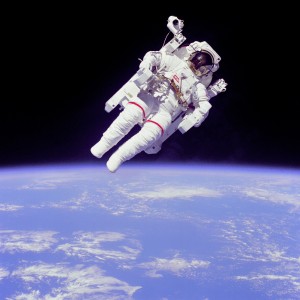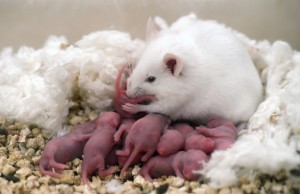
Astronauts in space are subject to high radiation doses that can cause serious harm to their health (Credits: NASA).
There has never been any doubt that space travel is not the leisure of choice for everyone. Despite the fact that some of the world’s richest people do not hesitate to pay incredible amounts of money to get a seat on yet unproven space vehicles, the majority of the population will probably never really cherish the idea of undergoing high G loads, space sickness, or prolonged confinement in a claustrophobic space capsule.
There are other, more serious issues, questioning the safety of long duration space flight – bone loss and muscle loss, and of course, exposure to cosmic radiation. The latter was the focus of two studies introduced in the beginning of April at the meeting of the American Association for Cancer Research in Washington, D.C.
A team of researchers based in the Georgetown Lombardi Comprehensive Cancer Center subjected a group of lab mice to high doses of 56Fe high energy radiation. This type of iron isotopes is a common product of nucleosynthesis in stars and forms an important part of cosmic radiation. For the mice it was anything but a pleasant experience – soon afterwards, most of them developed intestinal tumours.

Lab mice exposed to space-like radiation developed intestinal cancer (Credits: University of Wisconsin-Madison)
Further tests managed to shed more light on the underlying processes related to the dangerous spread of these malignant growths. It was revealed that the cosmic-like high energy radiation most likely blocks the ability of intestinal cells to destroy beta-catenin. Higher than normal levels of this protein, which is naturally present in cells, can trigger carcinogenic processes.
What does all that mean for astronauts and aspiring space travellers? “Sustained exposure during prolonged space missions, such as a mission to Mars, and lengthy stays at the International Space Station may cause significant cosmic radiation dose accumulation in astronauts, and thus remain a long-term health concern of space exploration,” explained Kamal Datta, a Georgetown University researcher. His colleague Shubhankar Suman added: “knowing how space radiation induces tumor formation will allow us to develop preventive strategies that target this specific signalling pathway.”
Whether this research could possibly help to improve prevention and treatment of other, non-space induced, types of stomach cancer was not discussed.















































![A trajectory analysis that used a computational fluid dynamics approach to determine the likely position and velocity histories of the foam (Credits: NASA Ref [1] p61).](http://www.spacesafetymagazine.com/wp-content/uploads/2014/05/fluid-dynamics-trajectory-analysis-50x50.jpg)



Leave a Reply